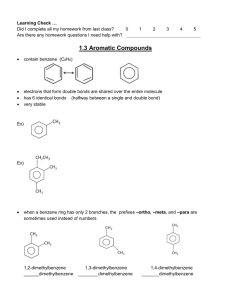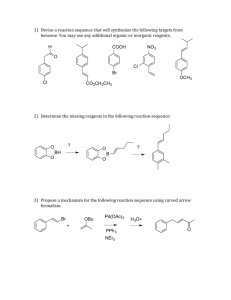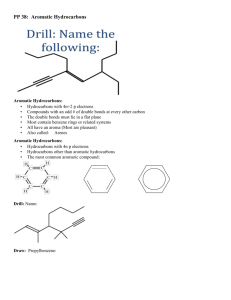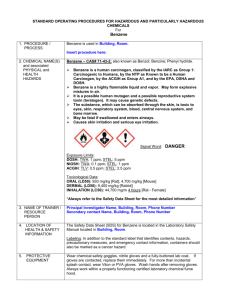benzene factsheet
advertisement
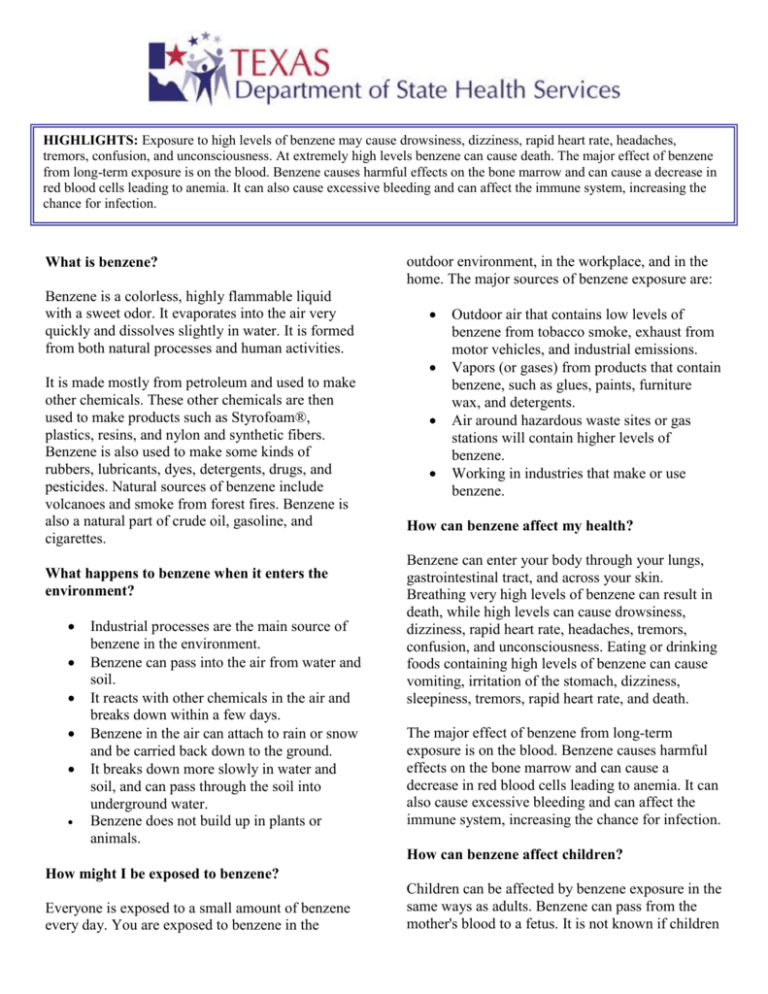
HIGHLIGHTS: Exposure to high levels of benzene may cause drowsiness, dizziness, rapid heart rate, headaches, tremors, confusion, and unconsciousness. At extremely high levels benzene can cause death. The major effect of benzene from long-term exposure is on the blood. Benzene causes harmful effects on the bone marrow and can cause a decrease in red blood cells leading to anemia. It can also cause excessive bleeding and can affect the immune system, increasing the chance for infection. What is benzene? Benzene is a colorless, highly flammable liquid with a sweet odor. It evaporates into the air very quickly and dissolves slightly in water. It is formed from both natural processes and human activities. outdoor environment, in the workplace, and in the home. The major sources of benzene exposure are: It is made mostly from petroleum and used to make other chemicals. These other chemicals are then used to make products such as Styrofoam®, plastics, resins, and nylon and synthetic fibers. Benzene is also used to make some kinds of rubbers, lubricants, dyes, detergents, drugs, and pesticides. Natural sources of benzene include volcanoes and smoke from forest fires. Benzene is also a natural part of crude oil, gasoline, and cigarettes. What happens to benzene when it enters the environment? Industrial processes are the main source of benzene in the environment. Benzene can pass into the air from water and soil. It reacts with other chemicals in the air and breaks down within a few days. Benzene in the air can attach to rain or snow and be carried back down to the ground. It breaks down more slowly in water and soil, and can pass through the soil into underground water. Benzene does not build up in plants or animals. Outdoor air that contains low levels of benzene from tobacco smoke, exhaust from motor vehicles, and industrial emissions. Vapors (or gases) from products that contain benzene, such as glues, paints, furniture wax, and detergents. Air around hazardous waste sites or gas stations will contain higher levels of benzene. Working in industries that make or use benzene. How can benzene affect my health? Benzene can enter your body through your lungs, gastrointestinal tract, and across your skin. Breathing very high levels of benzene can result in death, while high levels can cause drowsiness, dizziness, rapid heart rate, headaches, tremors, confusion, and unconsciousness. Eating or drinking foods containing high levels of benzene can cause vomiting, irritation of the stomach, dizziness, sleepiness, tremors, rapid heart rate, and death. The major effect of benzene from long-term exposure is on the blood. Benzene causes harmful effects on the bone marrow and can cause a decrease in red blood cells leading to anemia. It can also cause excessive bleeding and can affect the immune system, increasing the chance for infection. How can benzene affect children? How might I be exposed to benzene? Everyone is exposed to a small amount of benzene every day. You are exposed to benzene in the Children can be affected by benzene exposure in the same ways as adults. Benzene can pass from the mother's blood to a fetus. It is not known if children are more susceptible to benzene poisoning than adults. from the blood, this test is only useful for recent exposures. Is there a medical test to show whether I’ve been exposed to benzene? In the body, benzene is converted to products called metabolites. Certain metabolites can be measured in the urine. The metabolite S-phenylmercapturic acid in urine is a sensitive indicator of benzene exposure. However, this test must be done shortly after exposure and is not a reliable indicator of how much benzene you have been exposed to. Several tests can show if you have been exposed to benzene. There is a test for measuring benzene in the breath; this test must be done shortly after exposure. Benzene can also be measured in the blood; however, since benzene disappears rapidly The Texas Department of State Health Services (DSHS), Environmental and Injury Epidemiology & Toxicology Group has prepared this fact sheet to provide general information and answer some of the most frequently asked questions about benzene. For more information, contact the Environmental and Injury Epidemiology & Toxicology Group, 1100 West 49 th Street, T-702, Austin, Texas 78756. Phone (512) 458-7269. This fact sheet was funded in whole by funds from the Comprehensive Environmental Response, Compensation, and Liability Act trust fund through a cooperative agreement with the Agency for Toxic Substances and Disease Registry, Public Health Service, U.S. Department of Health and Human Services
